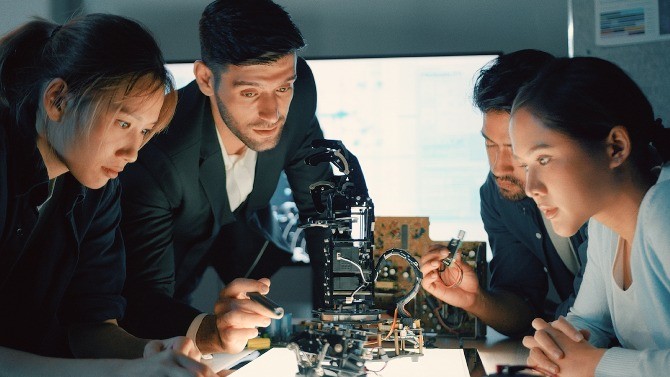{{item.title}}

Australia’s CEOs are at a crossroads: self-disrupt or be disrupted. This stark choice is illuminated in PwC’s 28th Annual Global CEO Survey – Australian insights. It’s a comprehensive analysis of the views of over 4,700 leading CEOs representing every region in the world’s economy, including 116 from Australia. It delves into the priorities, threats and optimism of business leaders amid a landscape reshaped by technological disruption, climate change and other megatrends.
Five interconnected megatrends are compelling CEOs worldwide to reimagine their business models: climate change, technological disruption, demographic shifts, a fracturing world and social instability. These forces, with their complex interactions, are accelerating the pace of change, demanding a proactive response from business leaders.
Globally, the necessity of reinvention is clear. Since 2000, 52% of Fortune 500 companies have vanished due to bankruptcy, acquisition, or closure. Reinvention is not optional. We surveyed chief executives in every region of the world’s economy and what became apparent was a strong association between the number of reinvention actions companies have taken in the past five years and the profit margins they achieved.
Globally, 63% of those surveyed have taken at least one significant action towards business model reinvention. Locally, there’s evidence Australia’s CEOs are also shifting mindsets and beginning to recognise the size and urgency of the reinvention imperative, but at a much lower rate.
In general, fewer companies have tackled actions associated with higher degrees of difficulty such as pioneering new routes to market, new pricing models or collaborating to create new ecosystems.
How to maximise the benefits of all this change, while mitigating the risks, is still up for debate. However, one thing is clear – Australia’s CEOs must act quickly and decisively to navigate the threats, challenges and opportunities on our doorstep.
Download the Australian insights report summary
Some of Australia’s leading CEOs are taking bold steps to reinvent their business models. For everyone else, there exists a stark choice: self-disrupt or be disrupted.
Australia’s business leaders brought a growing confidence to this CEO Survey, being more optimistic than they were this time last year. Almost half expect an improvement in global gross domestic product (GDP) in the next 12 months. They’re almost evenly split on the outlook for the local economy – one in three expects Australia’s GDP to improve or stay the same and 29% expect it will decline.
Compared with their global peers, Australia’s CEOs feel confident about their organisation’s future. Almost three quarters (74%) believe their business will be economically viable for more than 10 years if they continue down their current path (versus 55% of global CEOs). The contrast suggests many of Australia’s leaders believe their business is protected from the impact of converging megatrends currently causing global CEOs concern. This confidence, stemming from years of favourable conditions, might now be misplaced.
“CEOs in Australia run the risk of succumbing to the “success curse”. In the past, it’s been possible to sustain high profit margins without vast transformation thanks to a less competitive, more concentrated marketplace, as well as a relatively resilient economy. But Australia’s CEOs can’t afford to be complacent—don’t let past successes stifle future innovation.”
Significantly, companies taking more reinvention actions also reported early productivity wins using GenAI. Almost half of those surveyed in Australia (42%) said they achieved efficiencies through GenAI boosting employees productivity (Global 56%) in the last 12 months. More than a third of local CEOs (36%) say GenAI also increased efficiencies in their own use of time (Global 53%).
Despite these gains, only 14% of local CEOs linked GenAI to increased profitability, indicating an earlier stage of adoption. But, they are optimistic with 40% expecting an increase in profitability from GenAI in 2025.
Looking ahead, 56% of Australian CEOs plan to integrate AI into their core business strategies within the next three years, aligning with a broader recognition of AI's strategic importance. However, challenges remain, including internal skills gaps and the absence of a clear investment case.
Globally, CEOs are integrating sustainability into their business models, recognising the financial benefits of climate-friendly investments. While 33% of global CEOs reported revenue growth from such investments, only 17% of Australian CEOs observed similar outcomes, highlighting a gap in local adoption. As highlighted in our report Hidden Opportunities: Creating value through climate action, with great change comes great opportunity.
“Australia’s CEOs are responding to a different regulatory environment to CEOs in other parts of the globe. For instance, the European Union’s Corporate Sustainability Reporting Directive mandates detailed disclosures, while only a limited number of Australian companies have completed a double materiality assessment so far. However, we are witnessing an evolving awareness from Australia’s CEOs around climate challenges, and there’s a huge opportunity for Australia’s CEOs to learn lessons from the global experience.”
As global megatrends reshape industries, the need for reinvention is more urgent than ever. Australian CEOs must envision future ecosystems where their companies can thrive, supported by robust decision-making processes. Successful reinvention requires buy-in from teams and boards, and an openness to navigate uncertainty with informed, data-driven strategies.
The call to action for Australian CEOs is clear: embrace reinvention and secure a competitive edge in a rapidly evolving global landscape.
If you would like to talk further, contact Jon Chadwick and Simon Herrmann.
The findings of our 28th Annual Global CEO Survey show that CEOs are reaping early productivity gains from Generative AI and rising payoffs from investments in sustainability. The challenge is to increase scope and speed.
Theme Enter theme here
Simon Herrmann
Asia Pacific Leader in Generative AI, Partner, PwC Australia

© 2017 - 2025 PwC. All rights reserved. PwC refers to the PwC network and/or one or more of its member firms, each of which is a separate legal entity. Please see www.pwc.com/structure for further details. Liability limited by a scheme approved under Professional Standards Legislation.


